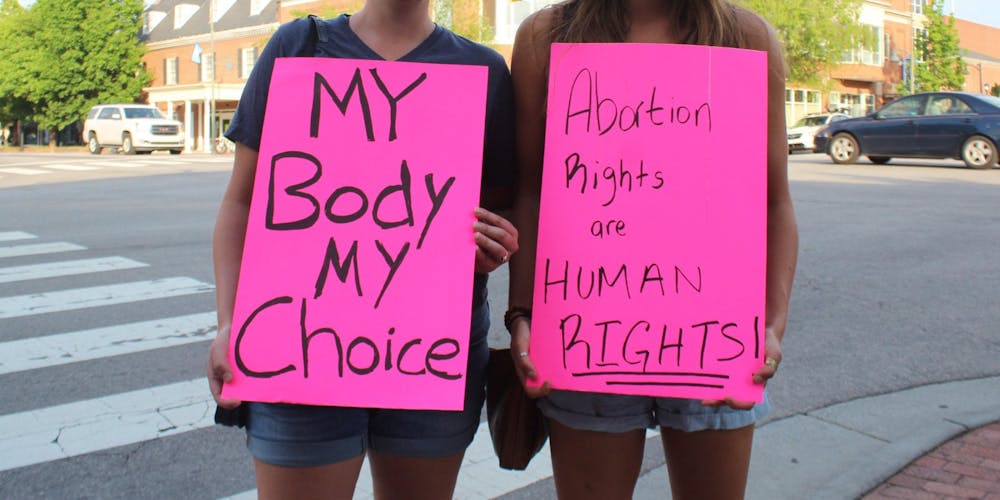In the draft opinion, Justice Samuel Alito, Jr. wrote that abortion is not protected implicitly nor explicitly by the U.S. Constitution.
“We hold that Roe and Casey must be overruled,” the draft opinion read. “The Constitution makes no reference to abortion and no such right is implicitly protected by any constitutional provision.”
Overturning Roe v. Wade would have consequences both across the country and in North Carolina.
13 states currently have “trigger laws,” meaning they would ban abortion once the Supreme Court allows it.
What does this mean for N.C.?
While North Carolina does not have these laws in place, it does have a currently unenforceable ban on abortions after 20 weeks of pregnancy.
Following the Roe v. Wade decision in 1973, North Carolina banned all abortions after the 20th week of pregnancy — before the fetus is viable outside of the womb.
The law was amended in 2015, but the 20-week ban stayed in place.
In June 2021, the Fourth U.S. Circuit Court of Appeals ruled that the ban must remain unenforceable under Roe v. Wade.
If Roe v. Wade is overturned, access in North Carolina could be restricted.
Jillian Riley, North Carolina director of public affairs with Planned Parenthood South Atlantic, said North Carolina would not immediately ban abortion if Roe v. Wade is overturned.
She said if the draft resembles the final opinion, Planned Parenthood is preparing for laws that limit abortion access in the state.
To get the day's news and headlines in your inbox each morning, sign up for our email newsletters.
“We do not have a trigger law on the books, and so we are not looking at an immediate ban on abortion if the final decision resembles something similar to this draft leak,” Riley said. “But that doesn't mean that we aren't preparing for something that could come out later on.”
Even if abortion remains legal in North Carolina, there could be an overload on the health system.
Some nearby states, such as Tennessee and Kentucky, have trigger laws. So, if an individual needed an abortion, they may need to travel to North Carolina to do so.
Rising UNC junior Cora Martin, a political science major, said they are concerned North Carolina could experience a rise in demand for abortions from out-of-state individuals.
“A lot of that burden will fall on North Carolina, which will make it harder for new Carolinians as well as folks from out-of-state to get access to care,” they said.
Riley said Planned Parenthood is preparing to increase its capacity and hours of operation to accommodate those from out-of-state who need an abortion.
“Because of these trigger laws, large swaths of the country are poised to ban abortion entirely,” she said. “So states like North Carolina and Virginia will be some of the closest places for people to access abortion care in neighboring states.”
But not everyone can afford to travel for an abortion.
If abortion is limited or banned in North Carolina, rising UNC senior Bri Smith said she is concerned that marginalized communities would put themselves at risk for an abortion.
“It's not going to be accessible, it's not gonna be possible,” she said. “And so for those communities, I think that's really where the physical and emotional harm is going to come into play.”
Grace Yannotta, a rising senior at UNC, said she is scared about the future of women’s rights in the state.
“If we don't have control over our own bodies, then what do we have?” she said.
Looking ahead
The draft is not yet finalized. Riley said it is important to remember that abortion is still legal in North Carolina.
“This is a draft opinion,” she said. “It is not the final word yet, and abortion is still safe and legal in North Carolina.”
While abortion is still legal, Riley said Planned Parenthood will keep its health centers open.
In any case, she said Planned Parenthood will fight to protect abortion access and is preparing for any possible outcome.
Riley said the most important way to take a stance on abortion is by voting for officials who support reproductive rights.
“We need people to actively support abortion, to actively support access to abortion,” she said.
Riley said another way to help destigmatize abortion is to share personal stories. She said one in four women will receive an abortion in their lifetime, but not many know who those people really are.
“It is very common for people to get an abortion,” she said. “It is basic health care, and it is something that deserves to be protected.”
@laurmccarthyy
@DTHCityState | city@dailytarheel.com



